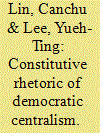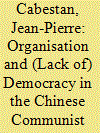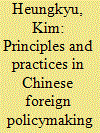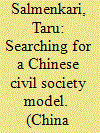|
|
|
Sort Order |
|
|
|
Items / Page
|
|
|
|
|
|
|
| Srl | Item |
| 1 |
ID:
117723


|
|
|
|
|
| Publication |
2013.
|
| Summary/Abstract |
Employing the theoretical framework of constitutive rhetoric, this paper explores Chinese conceptions of democracy by examining Mao Zedong's speeches and writings. This rhetorical examination seeks to show how democracy is understood, defined, and conceptualized in China. Several themes from Mao's most famous speeches and writings are discussed in the light of his concept of democratic centralism. The rhetorical analysis supports the notion that Chinese communism includes democracy, as purported by Mao; however, this culturally unique form of democracy (i.e. democratic centralism) does not match the representative form of democracy employed in the West. Understanding that democracy is conceptualized distinctly by Chinese communist followers of Mao may provide insight for future international studies and relations.
|
|
|
|
|
|
|
|
|
|
|
|
|
|
|
|
| 2 |
ID:
189219


|
|
|
|
|
| Summary/Abstract |
There has always been a lack of democratic life in the Chinese Communist Party (CCP). Former CCP Secretary General Hu Jintao attempted in the first decade of the twenty-first century to promote reform, including a revision of the party constitution, aimed at enhancing “intra-party democracy” (党内民主, dangnei minzhu). However, Xi Jinping has put on hold this plan, fully restoring the verticality of the institution where it may have been weakened. This article has three objectives. First, it compares the successive versions or iterations of the CCP constitution in the last 100 years and analyses all the changes related to democratic centralism, elections, and democracy that have been introduced. Then, it assesses Hu's reforms and their failure. Finally, it explains why the CCP cannot reform and democratise as long as it remains a party-state and China remains a one-party system.
|
|
|
|
|
|
|
|
|
|
|
|
|
|
|
|
| 3 |
ID:
110795


|
|
|
|
|
| Publication |
2012.
|
| Summary/Abstract |
This article explains principles and practices in China's foreign policy decisionmaking-and their implications for its policy toward South Korea. The author
argues that more serious attention should be paid to "democratic centralism" as a
guiding principle of decision-making, even in foreign affairs. This principle
favors consensus-building, coordination, and compromise in policymaking. As a
result, China often suffers time-wastage and inertia on non-routine issues in its
policymaking, which is quite different from the image of the top-down model.
Reflecting the structure of Chinese policymaking, China's foreign policies are more
likely to be risk averse, conservative, and prone to following status-quo policies.
China prefers the status quo to renovation of its Korea policy. Instead of taking
any new initiatives, China's foreign policy toward the Korean peninsula is likely to
adhere to its current policy priority of maintaining stability on the Peninsula. It is
also noteworthy that China may gradually depart from its slow and reactive foreign
policies to more proactive ones. As China becomes more capable of processing
non-routine issues, while making them routine ones, more proactive policies will
be realized although the gradual nature of Chinese decision-making is expected to
remain intact for the time-being.
|
|
|
|
|
|
|
|
|
|
|
|
|
|
|
|
| 4 |
ID:
085319


|
|
|
|
|
| Publication |
2008.
|
| Summary/Abstract |
This study hypothesizes that the Chinese state uses NGOs as objects of consultation for improving its policymaking in the same way it consults mass organizations, democratic parties, and official professional associations to obtain specialist information. This model of consultation is based on the mass-line model and on its application within democratic centralist administrative hierarchies. The investigation shows that, apart from their main social or environmental tasks, Chinese NGOs indeed inform the state, many of them with policy formulation in mind. It also shows that the Chinese state uses democratic centralist vocabulary to describe the tasks that it assumes NGOs should undertake. However, apart from the mass-line type of consultation, both NGOs and the state have other conceptions about the proper roles for NGOs. The state now promotes the idea of civil society as an independent service provider, while NGOs seek an even larger sphere of social autonomy and self-organization.
|
|
|
|
|
|
|
|
|
|
|
|
|
|
|
|
|
|
|
|
|